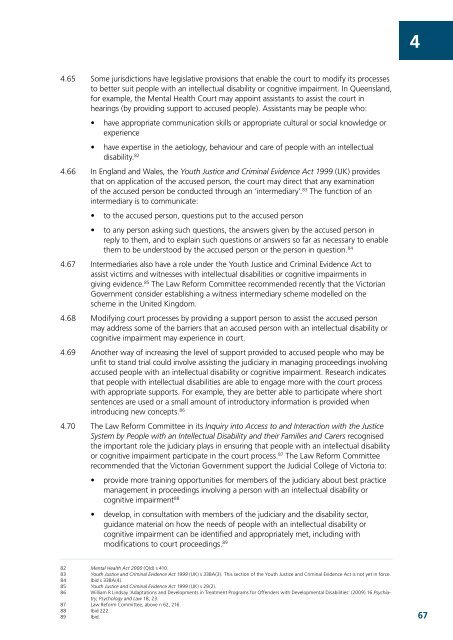Crimes Mental Impairment consultation paper.pdf - Victorian Law ...
Crimes Mental Impairment consultation paper.pdf - Victorian Law ...
Crimes Mental Impairment consultation paper.pdf - Victorian Law ...
Create successful ePaper yourself
Turn your PDF publications into a flip-book with our unique Google optimized e-Paper software.
4<br />
4.65 Some jurisdictions have legislative provisions that enable the court to modify its processes<br />
to better suit people with an intellectual disability or cognitive impairment. In Queensland,<br />
for example, the <strong>Mental</strong> Health Court may appoint assistants to assist the court in<br />
hearings (by providing support to accused people). Assistants may be people who:<br />
• have appropriate communication skills or appropriate cultural or social knowledge or<br />
experience<br />
• have expertise in the aetiology, behaviour and care of people with an intellectual<br />
disability. 82<br />
4.66 In England and Wales, the Youth Justice and Criminal Evidence Act 1999 (UK) provides<br />
that on application of the accused person, the court may direct that any examination<br />
of the accused person be conducted through an ‘intermediary’. 83 The function of an<br />
intermediary is to communicate:<br />
• to the accused person, questions put to the accused person<br />
• to any person asking such questions, the answers given by the accused person in<br />
reply to them, and to explain such questions or answers so far as necessary to enable<br />
them to be understood by the accused person or the person in question. 84<br />
4.67 Intermediaries also have a role under the Youth Justice and Criminal Evidence Act to<br />
assist victims and witnesses with intellectual disabilities or cognitive impairments in<br />
giving evidence. 85 The <strong>Law</strong> Reform Committee recommended recently that the <strong>Victorian</strong><br />
Government consider establishing a witness intermediary scheme modelled on the<br />
scheme in the United Kingdom.<br />
4.68 Modifying court processes by providing a support person to assist the accused person<br />
may address some of the barriers that an accused person with an intellectual disability or<br />
cognitive impairment may experience in court.<br />
4.69 Another way of increasing the level of support provided to accused people who may be<br />
unfit to stand trial could involve assisting the judiciary in managing proceedings involving<br />
accused people with an intellectual disability or cognitive impairment. Research indicates<br />
that people with intellectual disabilities are able to engage more with the court process<br />
with appropriate supports. For example, they are better able to participate where short<br />
sentences are used or a small amount of introductory information is provided when<br />
introducing new concepts. 86<br />
4.70 The <strong>Law</strong> Reform Committee in its Inquiry into Access to and Interaction with the Justice<br />
System by People with an Intellectual Disability and their Families and Carers recognised<br />
the important role the judiciary plays in ensuring that people with an intellectual disability<br />
or cognitive impairment participate in the court process. 87 The <strong>Law</strong> Reform Committee<br />
recommended that the <strong>Victorian</strong> Government support the Judicial College of Victoria to:<br />
• provide more training opportunities for members of the judiciary about best practice<br />
management in proceedings involving a person with an intellectual disability or<br />
cognitive impairment 88<br />
• develop, in <strong>consultation</strong> with members of the judiciary and the disability sector,<br />
guidance material on how the needs of people with an intellectual disability or<br />
cognitive impairment can be identified and appropriately met, including with<br />
modifications to court proceedings. 89<br />
82 <strong>Mental</strong> Health Act 2000 (Qld) s 410.<br />
83 Youth Justice and Criminal Evidence Act 1999 (UK) s 33BA(3). This section of the Youth Justice and Criminal Evidence Act is not yet in force.<br />
84 Ibid s 33BA(4).<br />
85 Youth Justice and Criminal Evidence Act 1999 (UK) s 29(2).<br />
86 William R Lindsay ‘Adaptations and Developments in Treatment Programs for Offenders with Developmental Disabilities’ (2009) 16 Psychiatry,<br />
Psychology and <strong>Law</strong> 18, 23.<br />
87 <strong>Law</strong> Reform Committee, above n 62, 216.<br />
88 Ibid 222.<br />
89 Ibid.<br />
67

















